- Home
- Mary Downing Hahn
Following My Own Footsteps Page 5
Following My Own Footsteps Read online
Page 5
Grandma took the note and read it. "Well," she said, looking at me sharp as a hawk, "at least you know how to spell your own name."
I started to leave but she grabbed my arm. "Is this the best you can do, Gordon?"
"I'm a moron, remember?"
"I didn't call you a moron."
"Maybe not, but you did say William might have had a reason for calling me a moron. Which, if you ask me, is the same as saying it yourself."
On the stove, a pot lid began bouncing up and down like the potatoes inside were making one last try to escape. Grandma laid the note down. "Run along, Gordon. We'll write this over again after we eat."
Like heck we would. She said to write an apology and I had. She didn't say anything about spelling and punctuation and all that dumb stuff. But I kept my thoughts to myself. No sense starting an argument. "Terry and the Pirates" was almost over. I'd worry about the stupid note later.
After dinner, Grandma and I spent two hours at the kitchen table, which meant I missed "The Lone Ranger." Not only did she make sure I spelled everything right in Great-aunt Mavis's note, she went over all my schoolwork. Nobody had ever done that before. I swear Mama hadn't cared what I did so long as nobody came to the house to complain. She was too tired out from the little kids and the old man to pay attention to what I did or didn't do in school.
It seemed to me Mama hadn't gotten over those days yet. Since we'd come to Grandville, all she'd done was sit in the living room and listen to the radio. One soap opera after another, starting with "The Romance of Helen Trent" at twelve thirty and going right on till "Young Widder Brown" ended at five and we switched stations for "Terry and the Pirates." That was a total of eighteen shows, each one dumber than the one before.
At first, Grandma did her best to make Mama take what she called "some responsibility." She tried everything from sympathy to yelling, but nothing worked. Mama just said, "Leave me alone, Mother," and went on listening to the radio, her face as blank as a gray sky in winter. She reminded me of pictures I'd seen of soldiers with battle fatigue.
After a couple of weeks, Grandma gave up. She took care of the little kids. Even persuaded Bobby to start using the toilet, which improved the atmosphere considerably.
Grandma also made sure June's dresses were ironed and her hair was braided nice and neat. She kept her shoes polished, too. Never had to nag her about school. June loved her teacher and she was soon reading better than I was. She could do some arithmetic, too. Right from the start, she'd smiled and wagged her tail, and now Grandma was smiling back. And so was everybody else. June even started bringing friends home with her, something she'd never done in College Hill, mainly because nobody's mother allowed their kids near our place. Here in Grandville, it seemed June could do no wrong.
As for me, I got more frowns than smiles both at home and at school. I didn't make any friends, either. Just enemies. But that's what I was used to, so it didn't matter.
One night we were sitting at the kitchen table, just Grandma and me. I was slaving over my arithmetic problems and she was checking my spelling words. Out of the blue, she said, "Did you know your father's on his way to California?"
I stared at her in disbelief. "I thought he was still in jail."
Grandma shook her head. "Your mother got a letter from him yesterday. Didn't she tell you?"
"Mama never tells me anything." I kicked the table leg, sorely vexed to know the old man was free as a bird. "How come they let him out of jail?"
Grandma sighed and took a sip of tea. "Your mother didn't stick around to press charges, Gordon."
Keeping my voice real low, I muttered a string of cuss words. If Grandma heard, she didn't let on.
"He's hoping to find a job in an aircraft plant in Bakersfield," she said, taking as much care as I did to avoid mentioning the old man's name. Not that she had to. We both knew who we were talking about.
"Good for him," I said, kicking the table leg harder.
"Your mother seemed happy to hear from him."
"She's nuts." With that, I slammed my arithmetic book shut and went up to my room. I expected Grandma to call me back. After all, I hadn't finished my homework. But she let me go without a word.
Not bothering to turn on the light, I flung myself on my bed and stared at the ceiling. At least the old man was heading west, not south. Maybe he'd stay in California and forget about us. I sure hoped so.
Ten
About a week after my big apology, I decided to visit William. Mrs. Sullivan opened the door. From the look on her face, you could tell I was the last person she wanted to see, but she invited me in anyway.
"William," she called. "Gordon Smith has come to see you."
"Great," William cried from upstairs. "Bring him to my room."
Mrs. Sullivan led the way toward the stairs. The first thing I noticed was this strange little seat on a track beside the banister.
"What's that thing for?" I asked.
"It's William's way of managing stairs," Mrs. Sullivan said. "He can ride it up or down."
"Can I try it?"
"Absolutely not." Mrs. Sullivan gave me a look that said I'd better keep my hands off William's contraption. "It's not a toy, Gordon."
Too bad it was in plain sight of the living room, I thought. Otherwise I'd have snuck a ride on it anyway.
"You can stay half an hour," Mrs. Sullivan said. "Don't play rough, don't make a lot of noise, and don't excite him. Remember, William's an invalid."
From what Mrs. Sullivan said, it seemed I would have had just as much fun visiting the old folks at the county home. The only difference was, William had toys and the old folks didn't. So I kept my thoughts to myself and followed Mrs. Sullivan to William's room.
William was waiting for me in his wheelchair. He seemed real pleased to see me.
"Here's Gordon," Mrs. Sullivan said as if William was blind as well as crippled. "Remember what I told you, dear."
William frowned. Whatever his mother had said to him was top secret. I guessed it probably had something to do with keeping an eye on me to make sure I didn't steal anything.
Mrs. Sullivan hung around for a few moments, adjusting the window shades and flicking dust off the furniture with a little flowered handkerchief. "Well," she said, trying to sound cheerful, "I guess I'll go down and listen to one of my shows. If you need me, William, just call. I'll keep the radio turned down so I'll be sure to hear you."
"I'll be all right, Mother," William said, watching her go as if he was afraid she might find something else to tidy before she left the room.
After Mrs. Sullivan had gone, I could hardly decide what to play with first. William had more toys than Sears and Roebuck. Good stuff from before the war like metal cars and trucks. His own radio. Tons of books and comics and games. Collections of stamps and coins.
But best of all was William's Lionel electric train. It had a whistle that sounded like the real thing, and the locomotive puffed smoke from little capsules you dropped in the stack. Its wheels went clickety-clack, and the freight cars had the right names on the sides—Lackawanna, Great Northern, Union Pacific. The track was a big loop that ran over bridges and through tunnels. There were woods and fields and streams, farm buildings and a town. Crossing signals blinked red and green and little bells rang to warn you the train was coming. It was the best layout I'd ever seen outside of a toy store.
"Let's make it go faster," I said, turning the lever on the control box. Soon the engine was flying around the track, shooting in and out of tunnels and crossing bridges, blowing its whistle like mad.
"Be careful," William said nervously, "you'll wreck it."
Just as he warned me, the train jumped the tracks. Cars shot off in all directions, tumbling end over end. It reminded me of the time a freight train derailed a mile or so from our house in College Hill and the old man went up there and stole a couple of cases of whiskey from a split-open boxcar. He said he'd have taken more if he could have carried it.
"Now look w
hat you did." William sounded as upset as a girl.
I picked up the cars and set them carefully on the tracks. "Nothing broke," I said, almost as relieved as he was. If I'd broken anything, I bet Mrs. Sullivan would have made me pay for it.
"My father bought this train set for me when I was born," William said. "He built the whole layout."
I whistled. "It must've cost a fortune."
William shrugged. Somehow I knew money didn't have anything to do with how he felt about the train.
"Dad died in the war," he told me. "His plane was shot down over Holland way back before I got polio. Sometimes I wonder what he'd think if he came home and saw me in this stupid wheelchair...."
William's voice trailed off. Scared he was going to start crying, I began talking about Donny. "My brother's in the infantry somewhere in Germany, but he's not supposed to say exactly where. He was in the Battle of the Bulge and a bunch of other stuff."
William drew in his breath. "You must be worried about him."
I shook my head. "Donny says no stinking German is going to kill him. He's too mean to die. Too tough. Kraut bullets bounce right off him." I puffed out my own chest to show him. "Like Superman."
William didn't say anything. He just sat there looking at me as if I was a little kid who believed in Santa Claus or something equally moronic.
"Donny jokes a lot," I muttered. "But he's brave. Nothing scares him. We're just alike, Donny and me."
William nodded. "He's Batman and you're Robin."
I looked at William, trying to decide how to take that remark. Was he being sarcastic? Or did he mean it? Since I couldn't tell, I picked up the locomotive and spun the wheels, admiring how nice and smooth they worked.
"Mother told me you have another brother," William went on. "She says he's a deserter."
I stared at William, shocked to hear he knew about Stu. "I guess your nosy mother told you about my old man, too," I said, feeling my face burn.
William looked embarrassed. "She didn't say much."
"How much is much?"
He shrugged and fidgeted with the fringe on his blanket. "I guess he's not very nice."
"No kidding." I set the locomotive on the track. "Tell your mother to mind her own beeswax," I added.
Getting to my feet, I went to the window and looked out into the branches of Grandma's tree. "How come you were spying on me those times?"
William rolled his chair to the window. "I wanted to see what you looked like. Mother told me you were coming to stay with Mrs. Aitcheson, so I—" He broke off with a shrug. "Maybe I'm just plain nosy."
"Maybe you are." I grinned when I said it. At least William was honest about things.
"I used to climb that tree myself before I got polio," he said. "The branch you always sit on was my favorite thinking place."
I didn't know what to say to that, so I stared down at Grandma's yard. June and Victor were running around, playing some dumb kid game. Ernie was chasing them, crying, "Me, too! Me, too!" Bobby was sitting on the porch steps, sucking his thumb and watching. Grandma hung one pair of overalls after another on the clothesline, telling June to stop shrieking, warning Ernie not to throw the stone he'd picked up, reminding Bobby to go to the toilet.
Only Mama was missing. She was probably sitting inside, listening to one of her soap operas. Sometimes I wondered what she got out of them. Why should she care what happened to Stella Dallas or Ma Perkins or Lorenzo Jones? They weren't real people, they didn't need her, so why was she so interested in them when she didn't give a hang about us? It didn't make sense.
William poked my side to get my attention. "You're lucky to have such a big family," he said. "I wish I had a brother or a sister."
"Which one do you want?" I asked, amazed anyone would be envious of my family. "You can have them cheap. A couple of dollars apiece. All except June—she's not for sale."
William laughed, but I swear if he'd handed me a dollar bill I'd have sold him Bobby on the spot.
"That's your window right there, isn't it?" William pointed at the one facing us. I studied it for a minute. He was right, it was mine. I hadn't even noticed.
"Our houses are so close we could talk to each other at night," William said. "When we're supposed to be asleep."
"I guess so," I said, though I wasn't sure what we'd say to each other.
Before Mrs. Sullivan came up to tell me it was time to leave, William let me run the train again. This time I kept the speed down. No wrecks.
Eleven
As the weeks passed, Mrs. Sullivan grew used to seeing my ugly face at the door. But she didn't seem to like me any better. Or trust me. I swear to God I half-expected her to check my pockets every time I left her house.
Strange as it sounds, no matter how his mother felt or what she said about me, William seemed to like me. Even more strange, considering how different he was from my old buddies Toad and Doug, I liked William. In fact, he was the only friend I had in Grandville. No matter how much I tried to horn in on Langerman's gang, none of them warmed up to me. They made it pretty clear I was a no-good Northerner, a damn Yankee. The only good thing was, they got tired of fighting me. Instead they just ignored me. Which in some ways was just as bad. Maybe even worse.
One Thursday in April, William and I were in his room, making model airplanes. He was much better at it than I was. The tissue paper stuck to my fingers, the balsa wood struts broke, the fuselage I built was lopsided, and the wings kept falling off. My P-47 wouldn't have been any threat to the Luftwaffe, that's for sure. But William's looked ready to shoot the Krauts out of the sky.
While we worked, we listened to the radio. Suddenly "The Green Hornet" was interrupted by a news flash so terrible neither William nor I could believe it. President Roosevelt was dead. A cerebral hemorrhage. At Warm Springs, Georgia. 4:35 in the afternoon.
We stared at each other, speechless. FDR had been president our whole entire lives. He couldn't be dead, he just couldn't.
"Maybe it's a hoax," I said, "like that radio show about the Martians invading earth. The War of the Worlds'—remember that?"
"Nobody'd joke about FDR dying," William said, but he let me change the radio station just in case I was right.
I turned the knob from one end of the dial to the other, but the same news was on every station. It was no joke. FDR was dead. Our new president was Harry'S. Truman. How could that be? Why, the war wasn't even over. How could we beat Hitler and Hirohito without FDR?
William stared at the radio. Tears ran down his face. "I can't believe it," he whispered. "I can't believe it, I just can't believe it." He was clutching his plane so tightly the balsa frame snapped like tiny gunshots.
"Me, either." I jumped to my feet. "I have to go home, have to tell Grandma."
I passed Mrs. Sullivan on the stairs. For a second, I thought she was going to hug me, but she ran past, rushing up to William.
At home, Grandma was sitting alone by the radio, weeping. I lingered in the doorway, hoping she'd notice me, maybe invite me to sit with her and mourn the president, but if she saw me she gave no sign. I went up to my room and lay down on my bed. It was like God had died and there was nobody to protect us from our enemies.
At dinner that night, Mama got into a fight with Grandma. It started when Grandma said, "I haven't felt grief like this since your father died, Virginia. It's as if FDR were a member of the family, someone I knew personally."
Mama shrugged. "If you ask me, we're better off without him. That New Deal of his almost ruined this country."
Too shocked to say a word, I stared at Mama. How could she say such awful things about the best president we'd had since Abraham Lincoln? Especially on the very day he died?
Grandma leaned across the table, her face fiery red with anger. "How can you say something so stupid, Virginia? The New Deal brought us out of the Depression. If it hadn't been for FDR—"
"Bunk." Mama looked Grandma in the eye. It was the most life she'd shown in a long time, but it was for
the wrong cause. "Not everyone shares your liberal ideas. Roger says—"
Grandma's face turned even redder. "I don't give a damn what Roger says. I won't hear his name mentioned in this house!"
Mama glared at Grandma. "I'll say his name as often as I like! Roger's my husband!"
"And a fine one he turned out to be. Just look at you. Seven children and no way to provide for them. You haven't got the sense of an alley cat!"
Bobby started to cry and Ernie joined in, but Victor and June just sat there, staring first at Grandma, then at Mama, and then back again at Grandma. They looked as scared as I felt.
But Mama didn't pay us any mind. She went on hollering in Grandma's face as if somebody had just pulled a gag off her mouth. "You and Daddy always hated Roger. You said he was no-good poor white trash, you said he'd never amount to a hill of beans."
Grandma leaned toward Mama, her eyes gleaming with spite. "I was right, wasn't I?"
Mama fished a letter out of her dress pocket and thrust it at Grandma. "Read this. Roger's got a good job at a defense plant in Bakersfield. He's working overtime so he can bring us out to California this summer. He's quit drinking, Mother."
Stunned speechless, I gaped at Mama. Surely she hadn't forgotten what a liar he was.
Grandma glanced at the creased and re-creased piece of paper lying beside her plate. From the look on her face, you'd think she was contemplating a dead rat. "I don't believe a word of it, Virginia."
Mama threw her napkin on the table and got up so fast her chair turned over. "You'd better believe it. Come July, we'll be on our way to California. All six of us."
Snatching the letter, Mama left the room. Bobby ran after her but the rest of us stayed put, too shocked to move.
"Is Daddy coming here, Grandma?" June whispered.
"That man wouldn't dare cross my threshold," Grandma said. "If he did, I swear I'd shoot him full of buckshot with your grandpa's old hunting rifle."
Grandma began clearing the table. June followed her out to the kitchen. I heard her say, "You wouldn't really shoot Daddy, would you?"

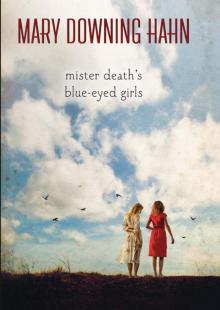 Mister Death's Blue-Eyed Girls
Mister Death's Blue-Eyed Girls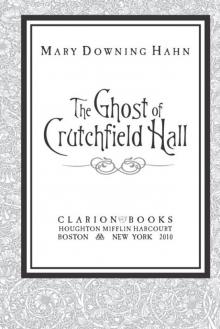 The Ghost of Crutchfield Hall
The Ghost of Crutchfield Hall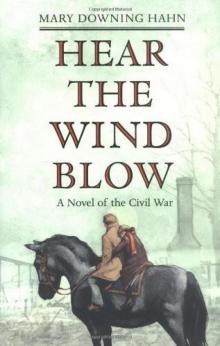 Hear the Wind Blow
Hear the Wind Blow Time of the Witch
Time of the Witch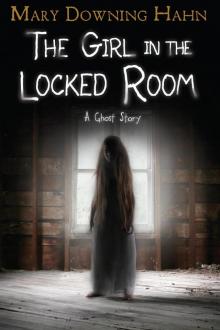 The Girl in the Locked Room: A Ghost Story
The Girl in the Locked Room: A Ghost Story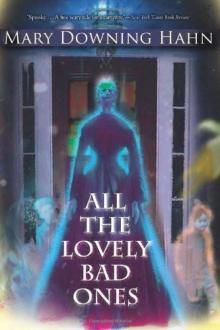 All the Lovely Bad Ones
All the Lovely Bad Ones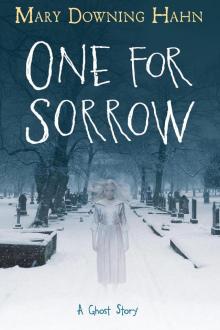 One for Sorrow
One for Sorrow Deep and Dark and Dangerous
Deep and Dark and Dangerous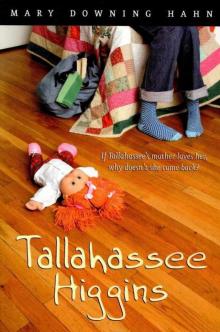 Tallahassee Higgins
Tallahassee Higgins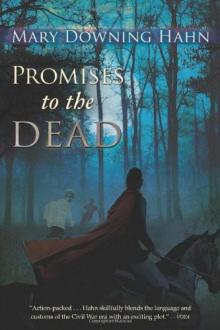 Promises to the Dead
Promises to the Dead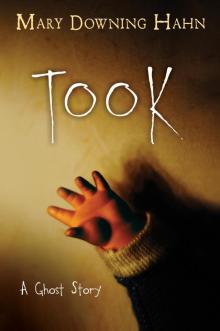 Took: A Ghost Story
Took: A Ghost Story Following My Own Footsteps
Following My Own Footsteps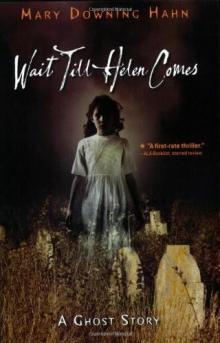 Wait Till Helen Comes: A Ghost Story
Wait Till Helen Comes: A Ghost Story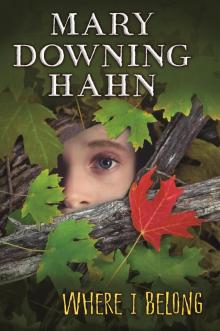 Where I Belong
Where I Belong The Spanish Kidnapping Disaster
The Spanish Kidnapping Disaster Look for Me by Moonlight
Look for Me by Moonlight The Old Willis Place
The Old Willis Place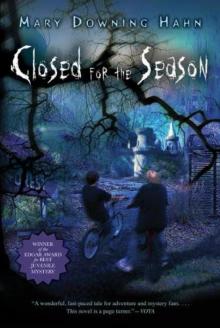 Closed for the Season
Closed for the Season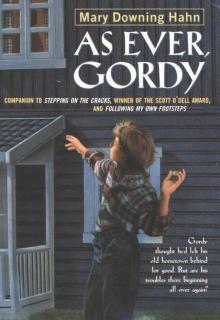 As Ever, Gordy
As Ever, Gordy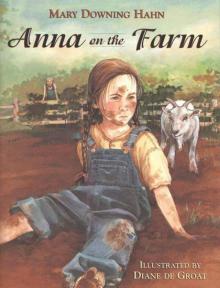 Anna on the Farm
Anna on the Farm The Doll in the Garden
The Doll in the Garden Daphne's Book
Daphne's Book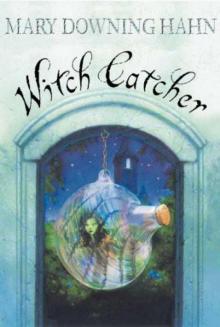 Witch Catcher
Witch Catcher The Gentleman Outlaw and Me--Eli
The Gentleman Outlaw and Me--Eli Wait Till Helen Comes
Wait Till Helen Comes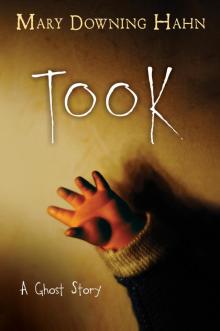 Took
Took A Haunting Collection
A Haunting Collection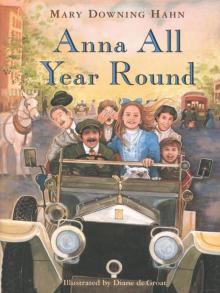 Anna All Year Round
Anna All Year Round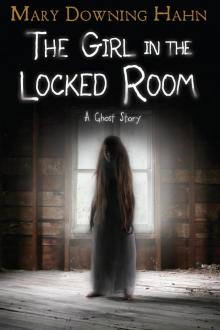 The Girl in the Locked Room
The Girl in the Locked Room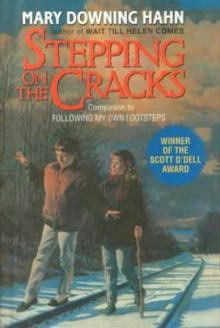 Stepping on the Cracks
Stepping on the Cracks